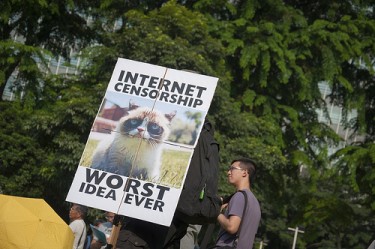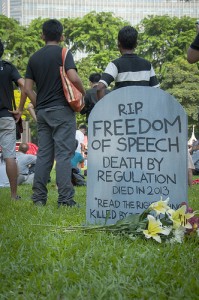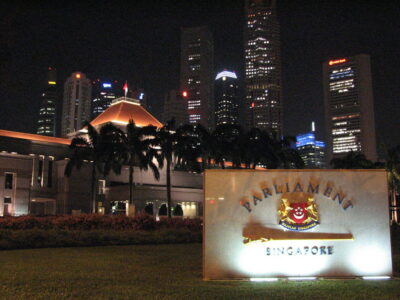An estimated crowd of 2,000 people joined a protest assembly in Singapore’s Hong Lim Park last June 8, 2013 to oppose the government’s new licensing scheme for news websites. Organized by the ‘Free My Internet’ movement, it was reported to be the ‘largest blogger-led protest’ in Singapore.
The new regulation issued by the Media Development Authority (MDA) requires news websites that report on Singapore and which have 50,000 unique IP views a month to secure a license. Further, they must put up a ‘performance bond’ of $50,000. The websites must also remove objectionable content within 24 hours after being ordered by the government. The MDA has so far identified 10 websites, including Yahoo! Singapore, which are covered by the ruling.
Prior to the Saturday event, more than 160 blogs participated in a ‘blackout’ protest. Despite the assurance of the government that blogs are exempted from the ruling, netizens described the new regulation as threat to Internet and media freedom. The video below shows some of the blogs which replaced their homepages with a black image.
The ‘Free My Internet’ movement issued this media statement after the protest:
The success of the campaign is no mean feat. #FreeMyInternet came together at a few days’ notice, and the three-prong campaign was organised within a week and a half. Given the spontaneous and leaderless nature of the #FreeMyInternet movement, this is a remarkable achievement.
In the weeks to come, we will roll out material and programmes to educate members of the public and Members of Parliament about why the Licensing Regime needs to be withdrawn.
We do not rule out a dialogue with the government, but this dialogue needs to be a discussion on how the withdrawal of the Licensing Regime will take place, and should be a dialogue about how de-regulating the media environment can best be done to benefit Singaporeans.
Some students challenged the Minister for Communications and Information to withdraw the regulation:
As young mass communications students and practitioners, this new framework concerns us as the wording of the amendment suggests that the State will have unmoderated power to muzzle not only journalists, but virtually everyone and anyone who uses the Internet
These concerns obligate us, in our capacities as concerned young Singaporeans, to request that the Minister for Communications & Information rescind the gazetting requiring online news sites to be regulated; and if he would not, to engage us in a dialogue to explain why he cannot.
Article 14 highlighted the success of the campaign:
…the bare mimimum that has been achieved this week is that the blogging community has sent a clear message that we value our limited space and are not willing to give it up easily
It helped to demonstrate the broad cross-section of support that exists for the freedom of online space.
Thoughts of a Cynical Investor congratulated the organizers:
Getting 2,000 to 2,500 S’poreans out at very short notice (less than a week) is a very good achievement, no a great feat, on the part of the organisers.
Ravi Philemon asserted that the protest is for ordinary Singapore netizens:
This protest is for us. Because this new regulation gives the government so much power to arbitrarily decide, nobody knows what kind of ‘traffic monitoring tools and perception-based surveys’ – maybe not even god knows, what these tools are – which site is a online news site and which is not.
Aaron Koh was inspired by the protest:
I attended the protest and was quite inspired by the speakers. The speakers, consisted mainly of bloggers, who were concerned, not only about MDA's online “news sites” licensing scheme, and at the speed at which it became law, without consultation with Parliament or with the Public.
Political Writings warned that small protests are not enough:
Whether protests are a legitimate way to force policy change or political change is a separate matter. What is important is that Singaporeans should realize that Hong Lim Park style ‘protests’ will not change anything.
Lim Jialiang explained the importance of participating in a cause:
It is crucial to remember that active participation is something that is to be proud of, even if participation might not translate to actual results at the end. There is nothing wrong in trying. There is something wrong, however, when people actively demean the efforts of others, who are trying their best to secure and speak out against at best, a toothless and aimless piece of regulation, and at worst, a new choker placed upon our democratic voice.





